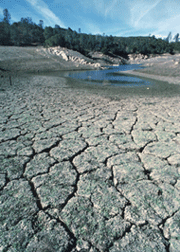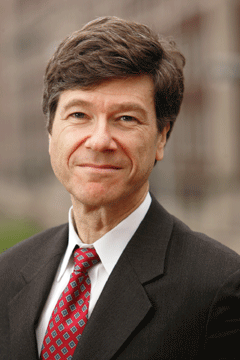International Climate Report Reveals World Vulnerabilities
Air Date: Week of April 6, 2007

Drought conditions in New Mexico. (Courtesy of USDA)
The Intergovernmental Panel on Climate Change released the results of its second Working Group this past week. The group's report focused on the impacts of global warming and adaptation to the changing climate. Host Steve Curwood talks with Jeffrey Sachs, director of the Earth Institute at Columbia University, about some of the larger conflicts that may arise as a result of climate change.
Transcript
CURWOOD: It’s Living on Earth. I’m Steve Curwood. Poor nations are at special risk from the droughts, storms and rising sea levels that are expected to result from global warming. That’s the warning contained in the latest assessment of the Intergovernmental Panel on Climate Change, made up of many of the world’s leading climate scientists.
Joining us now to discuss where and why we might see increased conflict related to global warming is Jeffrey Sachs. He is a professor at Columbia University and former director of the U.N. Millenium Project.
Hello sir!
SACHS: How are you? Good to be with you.
CURWOOD: So where in the world, what two or three areas of the world do you think are going to be hardest hit by climate change?
SACHS: I think the main message is that all parts of the world are going to be affected. And they’re going to be affected in major ways: in food production, in disease control, in risks of natural hazards like high intensity hurricanes, in changing water patterns, in vulnerability to drought and so forth.
But of course, as is so often true in life, it will be the poor and especially the poorest of the poor who are most vulnerable to these changes. For them an adverse shock often means nothing less than death.
CURWOOD: So what does this mean in terms of, well frankly, war and peace around the world?

Professor Jeffrey Sachs (Photo: Bruce Gilbert)
SACHS: We already have seen in the poorest places in the world conflicts due to lack of rainfall, for example. It’s known statistically, quite powerfully, we see it before our eyes in the case of Darfur and the Horn of Africa, that when the rains fail, the wars come. Let me point out that a place like Darfur is at the core, a place suffering from extreme draught. And by the best evidence at least a part of the draught is a decline of rainfall due to man made climate change. But we’re going to see tremendous stresses in many parts of the world, and not only the poorest. Australia was hit by a mega draught, which caused a mega loss of its traditional grain exports this year. Those effected world market prices everywhere. The consequences of simply continuing on the path that we’re on is enormous risk that different countries will be pushed over the edge, that the living standards of those above the margin will suffer and that always causes political conflict. And those living on the edge of survival will be pushed right over the edge.
CURWOOD: What about the question of refugees. Whether it’s drought that forces people off the land, or rising sea levels, or catastrophic storms, people are going to find that home isn’t so hospitable any more and want to go someplace else. That’s sure to lead to conflict I would think.
SACHS: We’re going to see tremendous pressures of mass coastal populations trying to move inland, but where? We also see it in people moving out of draught stricken regions. In Africa you see the land-locked countries sending populations to the coastal economies. And when those new populations come in there are massive clashes of politics that often trigger mass violence. This is one of the things that happened in Cote d’Ivoire in the Ivory Coast. We’re also seeing of course lots of refugee movement around the Darfur crisis and the South Sudan crisis, around Somalia and in the pastoral lands of northeast Kenya. So, this is a quite pervasive phenomenon. People move to where they can stay alive. We know that there are already large water migrations taking place in India. This is the way of humanity to move when survival prospects diminish. But in a system of national boundaries and flash points of cultural conflict this obviously already does trigger violence and could potentially trigger a lot more.
CURWOOD: I want to look at China for a moment here. It’s growing economically rapidly but also the Gobi Dessert north of it is growing rapidly and moving south. There’s a water squeeze, there’s a people squeeze. They have high demand for energy. What will happen in China as the effects of climate change crank into the ecology and should we say the economy?
SACHS: China is the perfect exemplar where these issues of sustainable development could never be considered to be second tier say behind, say the economy. They are part and parcel of China’s very development challenge. If there is one risk for China’s long term growth it actually won’t be politics in my view, it is going to be the environment. Will there be a way to live sustainably where you have 20 percent of the world’s population but you have about six to seven percent of the world’s arable land and a similar proportion of access to water resources.
In northern China you have a traditionally dry area that is going to be tremendously hit by the depletion of ground water because it’s been over pumped. And those water stresses are leading to massive bewildering plans of diverting huge water systems from the south of China, the Yangtze, and other water systems up through the North in giant canals with no doubt enormous ecological consequences. And in the north the great Yellow River often no longer runs to the sea. Add on top of that the problems of snow melt, precipitation change, glacier disappearance and so forth and the water challenges in China become absolutely a first tier question for China’s long term economic development. I know the leaders are very much concerned about this. There are not easy answers right now, but it is one of the reasons why, in my view, China will come to the negotiating table and be a lead participant in the long term solution to climate change. They simply have to do it.
CURWOOD: You sound very optimistic.
SACHS: I am optimistic. I’m optimistic because the drama that we’re in is so stark the costs of inaction are so great and yet the costs of real solutions are so modest relative to the risks of doing nothing. If we’d simply flipped our way of thinking and stopped seeing this as a war of us versus them, but a challenge in which we’re all on the same side facing common ecological challenges, we’d find a tremendous camaraderie in fact that could easily be developed and that would be crucial in finding the deeper solutions to these problems.
CURWOOD: Jeffery Sachs is director of the Earth Institute at Columbia University. Thank you sir.
SACHS: Great to be with you. Thank you very much.
[MUSIC: Amon Tobin “Horsefish” from ‘Foley Room’ (Ninja Tune - 2007)]
Links
To listen to host Steve Curwood's conversation with Thomas Homer-Dixon, click here.
IPCC Working Group II: Climate Change Impacts, Adaptation and Vulnerability
Outline for the IPCC Working Group II Contribution to the Fourth Assessment Report
Living on Earth wants to hear from you!
Living on Earth
62 Calef Highway, Suite 212
Lee, NH 03861
Telephone: 617-287-4121
E-mail: comments@loe.org
Newsletter [Click here]
Donate to Living on Earth!
Living on Earth is an independent media program and relies entirely on contributions from listeners and institutions supporting public service. Please donate now to preserve an independent environmental voice.
NewsletterLiving on Earth offers a weekly delivery of the show's rundown to your mailbox. Sign up for our newsletter today!
 Sailors For The Sea: Be the change you want to sea.
Sailors For The Sea: Be the change you want to sea.
 The Grantham Foundation for the Protection of the Environment: Committed to protecting and improving the health of the global environment.
The Grantham Foundation for the Protection of the Environment: Committed to protecting and improving the health of the global environment.
 Contribute to Living on Earth and receive, as our gift to you, an archival print of one of Mark Seth Lender's extraordinary wildlife photographs. Follow the link to see Mark's current collection of photographs.
Contribute to Living on Earth and receive, as our gift to you, an archival print of one of Mark Seth Lender's extraordinary wildlife photographs. Follow the link to see Mark's current collection of photographs.
 Buy a signed copy of Mark Seth Lender's book Smeagull the Seagull & support Living on Earth
Buy a signed copy of Mark Seth Lender's book Smeagull the Seagull & support Living on Earth

